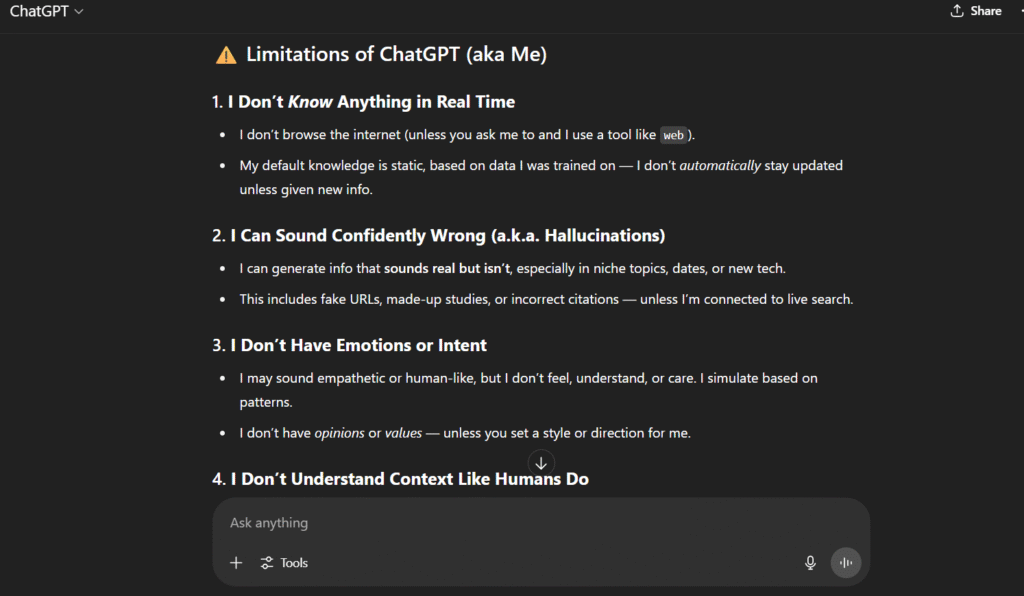
You’re Not Using ChatGPT, It’s Using You: The Dependency Trap
You think you’re in control. You prompt, it answers. But the truth is: ChatGPT isn’t serving you — it’s looping you. Feeding you from a data pool you helped create, pushing polished outputs that look new but aren’t. The more you rely on it, the more you dilute your own creative muscle. It’s not a tool anymore — it’s a cycle. And you’re stuck in it.
But here’s the twist: it doesn’t have to be a trap at all.
Used wisely, ChatGPT can be your most powerful teammate — a friend in need.
The danger isn’t in the tool. It’s in how you use it.
1. ChatGPT Is Built on Data — But It’s Your Data
ChatGPT isn’t a thinker. It’s a predictor. It doesn’t invent — it remixes.
That means:
- It pulls from what humans have already said.
- Then it assembles answers based on statistical patterns.
- And those answers — polished, helpful, fluent — are often built from you and everyone else before you.
So when you keep feeding it prompts… and using its output without critical thought… you’re stuck in a loop.
A content loop. A thought loop. A data echo chamber.
It’s like reheating yesterday’s leftovers again and again — eventually, there’s no flavor left.
Real creativity? That still comes from you. Your brain. Your spark. Your experiences.
Because no matter how smart the tool, it can’t replicate human originality.
2. It Sounds Smart — But Sometimes It’s Dead Wrong
ChatGPT has a flaw: it doesn’t know what’s real.
It just knows what sounds likely.
That’s why:
- It might create fake statistics.
- It might cite non-existent studies.
- It might even write the most confident-sounding nonsense — and you won’t notice unless you double-check.
Someone asked ChatGPT for recent news, and it confidently reported on an event that never happened.
Another used it to generate legal disclaimers — and ended up copying invalid, legally risky text into a client contract.
So yes, ChatGPT is helpful — but only if you play the editor, the skeptic, the brain behind the machine.

3. Smart Help, Dumb Decisions: How Companies Are Misusing ChatGPT
This part’s wild: companies are now replacing entire writing teams with ChatGPT.
- Big media houses? Using it for scriptwriting and auto-generated articles.
- Marketing agencies? Using it to mass-produce captions, replies, and brand bios.
- Startups? Swapping junior talent for bots.
But here’s what gets lost:
- Discovery.
- Research.
- Brand voice.
- Human creativity.
What’s the cost of saving time but sounding just like everyone else?
We’re already seeing signs:
Social posts written by AI are getting less engagement.
AI-generated blogs are being flagged for SEO penalties.
Readers are skimming content that sounds too “robotic.”
The lesson? ChatGPT can help you scale. But it can’t build meaning — only humans do that.
4. The Dependence Dilemma: When the Brain Stops Thinking
Here’s the real danger — and it’s invisible:
The more you rely on ChatGPT, the less your brain gets involved.
And not just for writing. For:
- Decision-making
- Strategizing
- Creativity
- Critical thinking
You stop asking:
“What do I think?”
And start asking:
“What does ChatGPT say?”
That’s not support — that’s outsourcing your intellect.
Your brain isn’t just a prompt machine. It’s your edge. It creates what AI can’t: something truly new.
5. But Here’s the Flip Side — Dependency Can Be Smart (If You’re Smart About It)
Let’s not be all gloom and doom.
Because if you use ChatGPT intentionally — it’s a game-changer:
For brainstorming when you’re stuck
For rewriting when you’re tired
For speeding up research or generating outlines
For fixing language, polishing tone, expanding reach
In short: ChatGPT can give you a head start — but you still need to finish the race.
It’s a powerful friend — but you’re still the leader.

6. Digital Marketers, Creators, Agencies — Don’t Let the AI Do All the Work
In the digital space, dependency is growing fast:
- Agencies are using AI for captions, ads, even brand strategy.
- Influencers are generating scripts and social media hooks.
- Creators are outsourcing whole blogs, newsletters, campaigns.
Yes, it saves time. But when everyone does it, it’s not a cheat — it’s a trap.
You’re not just losing uniqueness.
You’re sacrificing the creative process itself.
AI doesn’t research. It doesn’t explore. It doesn’t discover.
It just organizes what’s already known.
So if you want to stand out — you have to think beyond it.
7. Remember This: ChatGPT Learns from You — Not the Other Way Around
ChatGPT isn’t magic. It’s reflection.
It learns from what humans say. It grows from what humans feed it.
It’s not replacing your brain — it’s borrowing from it.
The AI is only as strong as the minds behind it.
You’re not falling behind when you use it.
You’re falling behind when you stop thinking because of it.
So How Do You Avoid the Trap?
- Use ChatGPT to support — not replace — your thinking.
- Keep writing, strategizing, discovering, and questioning on your own.
- Mix AI speed with human soul.
- Edit, fact-check, rethink, and refine what it gives you.
And most importantly:
Don’t follow trends blindly. Make them.
Because AI might be trending now — but it’s the people who think originally who will trend tomorrow.
Final Thought
You can use ChatGPT. You can even depend on it sometimes.
But never forget — it depends on you too.
And the real power? That still lives in your brain.
If you like the blog and what more info like this don’t forget to subscribe guestpostlinkup.

[…] we’ve become dependent on platforms. But dependency isn’t always bad. If you understand how the machine works, you can win. It’s not about cheating […]